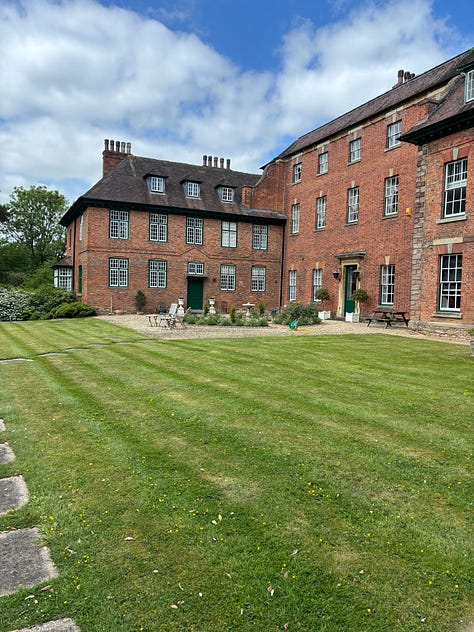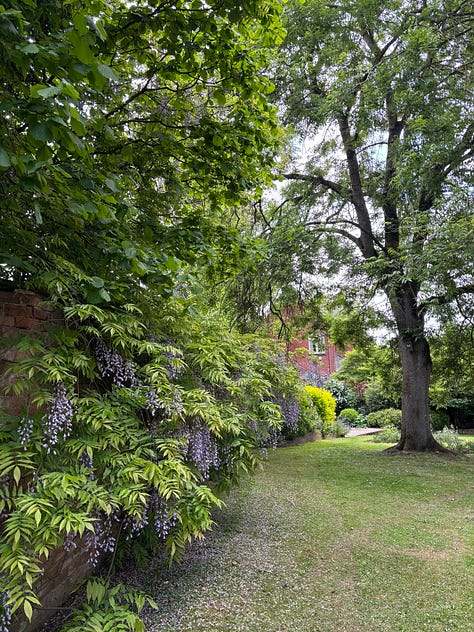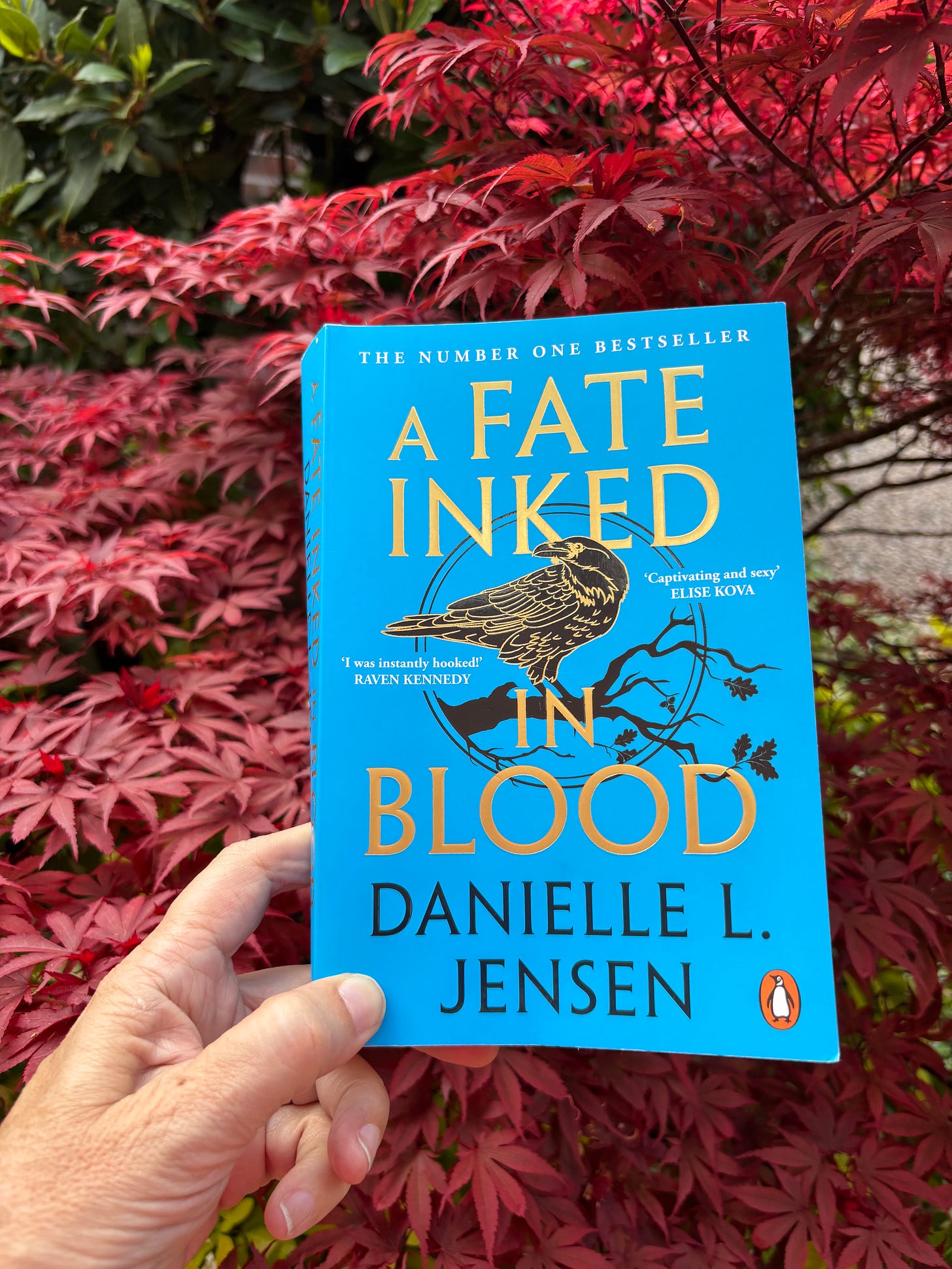Hello from Ledbury!
Doesn’t life just love throwing spanners?! Just as I thought I was settling into a new routine of casual relief teaching and a little more time for writing, life has spun on its head over the past week, and I find myself not Down Under, but back in Blighty.
Unfortunately, my 92-year-old mother had a fall, broke her hip and ended up in hospital having to have a hip operation. In order to support her, I’ve flown back to the UK and will be spending the next 6 weeks helping Mum to recuperate. I’m not sure quite what to expect. It could mean that I have more time for writing or it could be that I’m run off my feet playing nurse. Any tips from anyone who’s been through something similar?
I arrived late last night feeling horribly jet-lagged after a 28-hour flight, more hours waiting for a bus, then a two-and-a-half-hour bus journey here. But, after a good night’s sleep and a walk into the local market town of Ledbury, my batteries are feeling recharged.
I’m going to desperately miss my family and friends in Australia, but as always there are silver linings: the gift of time with Mum, a slower pace of life (and hopefully more time for reading and writing) and England looking and smelling spectacular! I don’t know what it is about the scent of spring here, but everything is blooming, and it smells marvellous! Here are a few photos of my stroll into town this morning.






Meanwhile, as I wait for my mother to be delivered from the hospital, I plan to get stuck into some writing …
Writing News
I’m about 60k words into my current romantasy manuscript and loving writing in a new genre. I’m confident about getting the first draft done by the end of June (unless life throws any more spanners at me!). Perhaps it’s fortuitous being back here, because Ledbury’s cobbled streets and old world charm plays into the fantasy world of my story (although I’m also digging into my historical knowledge and time spent at university (and on countless holidays) in Scotland). Scotland and its history has provided much of the inspiration for both the setting and the characters in my story, yet it’s been liberating to step away from historical ‘accuracy’ in favour of the fantastical.
I’ve been reading and listening to a lot of romantasy fiction lately, and couldn’t resist the temptation of shopping at the airport.
I literally flew through this book. It’s a Vikingesque romantasy with some pretty spicy sex scenes!
Which brings me neatly on to an article I wrote for Romance Writers of Australia recently which I’ve included below. I think sex scenes are probably one of the hardest things to do well in fiction because we all have our own personal concept of what is compelling or what jars us from a story. I certainly have some pet hates when it comes to the vocabulary used. Do you? I know I have to get over worrying about what other people (especially close friends and family) think of my writing of sex scenes and write what feels right for me. At the same time, I think that involves a conscious effort to be somewhat bolder when writing intimate scenes, and I’m yet to decide where to draw the line. Anyhow, I’d love to hear your thoughts and any recommendations for romantasy fiction where you think intimate or sex scenes are written brilliantly, or indeed, examples that jerked you (no pun intended) out of the story.
I look forward to catching up with more news from England. In the meantime, I look forward to hearing from you. Stay hale and hearty — Don’t trip up! — and enjoy your reading and writing!
Best wishes wherever you are!
Anna
xx
How salty is your story?
By Anna Foxkirk
Swearing has probably been around since the first caveman (or woman) slipped with their flint and gouged a hole out of their finger, but when it comes to the question of how much profanity is acceptable, it’s a rather controversial topic among authors.
As a proud editor and writer with a 1-star review for ‘blasphemy and ribald behaviour’, I know from experience it’s impossible to please all of the people all of the time: one person’s catnip is another person’s cat litter.
When it comes to deciding your preferred profanity barometer, you might like to consider the following questions:
Do you know your reader? My advice is to read, read, read in your genre and carefully consider your target audience and their expectations. For instance, you’re not likely to want to include blasphemy in an Amish romance or sweet Christian romance, in formal academic writing (unless you’re quoting someone) or when writing for young children. Even if you’re writing for teens or adults, you still need to consider the gatekeepers (especially if you’re want to get into traditional publishing). If you’re submitting to a particular publishing house or imprint, I strongly recommend finding an author who writes for them and asking their advice.
Is strong and potentially offensive language appropriate or necessary? Considering context and situation is also important when you’re writing, otherwise you risk using profanity indiscriminately. I like to think about swearwords like salt – you don’t want oversalt your fiction and make it unpalatable.
But how much bad language is too much? Taste and adjust.
I have to admit, I’m partial to the odd f-bomb if and when the occasion merits it, but it’s usually for the following reasons:
· When it’s appropriate for the genre and context.
· When it’s helpful to establish authentic characterisation.
· When it’s needed to pack a strong emotional punch to show anger, frustration and shock.
However, even if you’re creating a character who’s a foul-mouthed scumbag, be aware that too much offensive language in your prose or character’s dialogue can detract from your story and become an irritant. I once edited a story with so many fucks, I stopped reading the story and started counting expletives.
When we craft characters and write dialogue, we don’t want to write an exact transcript of a real conversation we’ve overheard. We write an ‘approximation’ in order to craft a realistic and authentic impression of a character. You need to create the character and carry the story without irking the reader. Expletives are more often than not ‘filler’ words which can make prose horribly flabby. When you edit your work, removing swearwords may tighten your prose.
Another thing to be sensitive about is cultural variation. I always thought Australia had a more liberal attitude to swearing than in Britain, but at a recent author talk with Amie McKnee, she explained that the publishers of the British edition of her book, ‘We Need Your Art’, were more liberal than either Australian or American editions. On the first page of her book for those editions is this footnote:
‘I have a proclivity for swearing, and my favourite curse word is fuck. In the first draft of this book, the word appeared 130 times. However, to account for different tastes in profanity, we have opted to use the word screw instead. But please know that every time you read the word screw, I mean fuck.’
What it boils down to is this. Swearing can make your fiction feel more edgy and exciting, and it’s up to you how salty you want your story to be, but do be aware that not everyone will have the same tastes as you. Yes, strong language is a potential enhancer, but like any other tools in an author’s toolkit, it should be used judiciously and purposefully, rather than splattered onto the page like a mafia hitman having a bad hair day. If profanities and offensive language are overused, they lose their potency and have the potential to turn off readers. Yes, sometimes an f-bomb is called for, but when it comes to finding the right balance of saltiness for your stories, often less is more.







So sorry to hear about your mum.x
Lots of useful pointers here